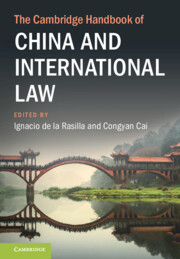Book contents
- The Cambridge Handbook of China and International Law
- The Cambridge Handbook of China and International Law
- Copyright page
- Contents
- Figures
- Contributors
- Foreword
- Acknowledgements
- Abbreviations
- Introduction
- Part I Taking Centre Stage in Global Governance and the International Legal Order
- Part II Interfaces between National and International Law
- Part III Selected Areas of Chinese State Practice
- 7 China’s Treaty Practices
- 8 The Solid State of State Immunity in the People’s Republic of China
- 9 The ‘Effect Doctrine’ and the Extraterritorial Application of Chinese National Laws
- Part IV International Peace and Security
- Part V Human-Centred International Law
- Part VI The Habitat and the Global Commons
- Part VII International Economic Law
- Part VIII International Dispute Settlement
- Index
7 - China’s Treaty Practices
Politicization of Law or Legalization of Politics?
from Part III - Selected Areas of Chinese State Practice
Published online by Cambridge University Press: 04 January 2024
- The Cambridge Handbook of China and International Law
- The Cambridge Handbook of China and International Law
- Copyright page
- Contents
- Figures
- Contributors
- Foreword
- Acknowledgements
- Abbreviations
- Introduction
- Part I Taking Centre Stage in Global Governance and the International Legal Order
- Part II Interfaces between National and International Law
- Part III Selected Areas of Chinese State Practice
- 7 China’s Treaty Practices
- 8 The Solid State of State Immunity in the People’s Republic of China
- 9 The ‘Effect Doctrine’ and the Extraterritorial Application of Chinese National Laws
- Part IV International Peace and Security
- Part V Human-Centred International Law
- Part VI The Habitat and the Global Commons
- Part VII International Economic Law
- Part VIII International Dispute Settlement
- Index
Summary
China has become an active treaty-maker by entering into a large number of bilateral, trilateral and multilateral treaties. More recently, China has been actively engaged in some high-profile negotiations with the EU, the United States and ASEAN, with the aim of expanding its economic network. However, China’s treaty behaviours have come under scrutiny. This chapter aims to conceptualize China’s treaty behaviours through some case studies, including the Joint Declaration of the Government of the United Kingdom of Great Britain and Northern Ireland and the Government of the People’s Republic of China on the Question of Hong Kong, China’s signing of the International Convention on Civil and Political Rights and the UN Convention of State Immunity and International Legal Order. These case studies indicate China’s paradox in treaty-making. While it attempts to legalize its political will through treaty-making, its enforcement of these treaties may be subject to a politicalized endeavour.
Keywords
- Type
- Chapter
- Information
- The Cambridge Handbook of China and International Law , pp. 133 - 160Publisher: Cambridge University PressPrint publication year: 2024

